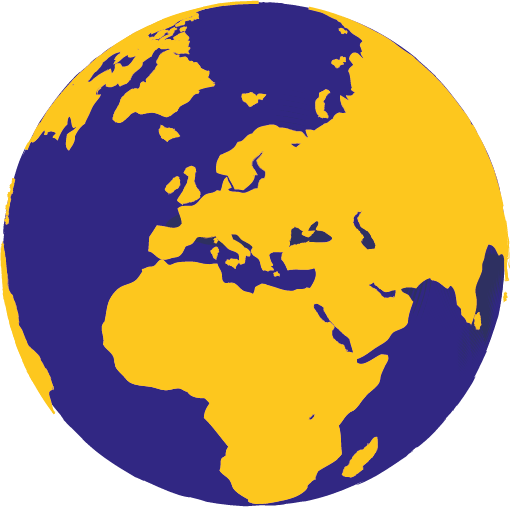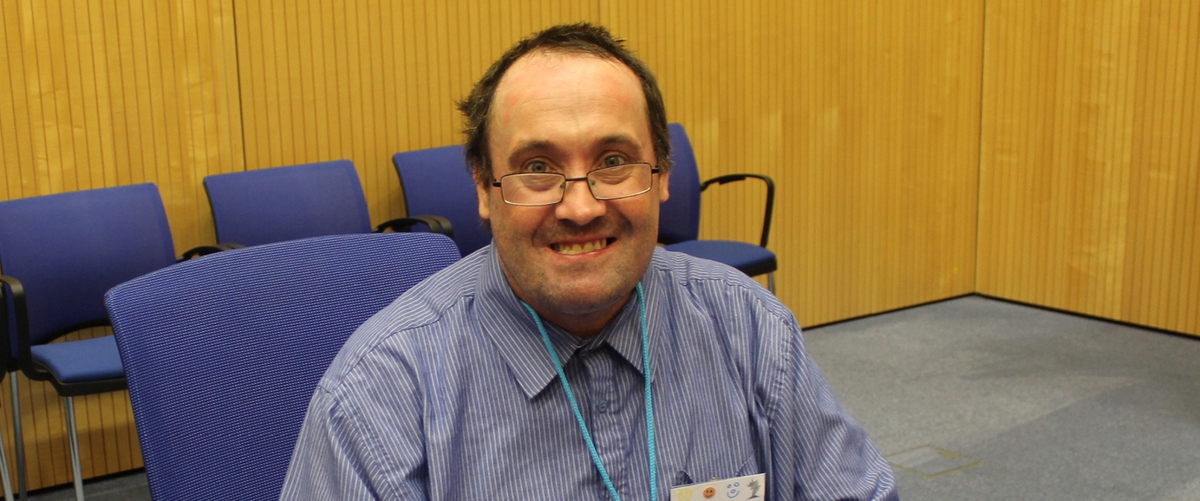Shaun Webster works as an International Project Worker at CHANGE, he is a self-advocate who has worked with Lumos to support children with learning disabilities become self-advocates, enabling them to engage with their national governments and contribute to national policies and action plans which are about the rights of children and adults with learning disabilities.
Shaun 38, lives in Rotherham, South Yorkshire and is a parent to 3 children (Jamie 19, Samantha 17, Lisa nearly 8). Shaun, who has learning disabilities, works for CHANGE (a leading national equal rights organisation led by disabled people) as a human rights and self-advocate trainer, speaker and campaigner. He lives with support from KeyRing housing organisation, which enables people with learning disabilities to live independently.
Shaun attended the conference on the World Health Organisation’s declaration: Better health; Better lives, where he helped Lumos support young self-advocates to contribute to the development of the declaration. Shaun shared his thoughts on the declaration with us:
What challenges did you face when growing up?
I went to a special school and because I couldn’t read or write and, because I used to be deaf for 5 or 6 years, my speech problems were really bad. That was a big challenge for me because people didn’t understand what I was talking about and I used to be picked on a lot. And because I’m dyslexic reading and writing was a problem for me as a teenager. My mother wanted me to go to a special school because she thought it would help me so she wanted me to drop out of normal classes. But we didn’t learn much.
What would things be like if you had been educated in a mainstream school?
At the time, if I was at the normal school it would have been fairly hard for me because I’m dyslexic and was deaf and speech impaired it would have been fairly difficult for me. I wouldn’t have been able to cope with the workload and bullying and I would have been told to leave.
What can we learn from your experiences?
In the 1980s people with learning disabilities were not respected, the attitude was bad, they think you won’t learn anything and they used to push us from everybody. And that is wrong. I came to CHANGE and they’ve been able to help me a lot and I am a good speaker and a good listener. Attitudes have got a lot better but we still have a lot to work on. People still think that people with learning disabilities can’t do anything so we need to educate people.
Can you describe the achievements you have had?
I was working in a warehouse for a major retailer and was working there for about 6 years and the first year was fine, but the next year I was starting to get a bit bored so they got me doing stock control. I was slow at it but I found it interesting and I thought I could do more of that. So I asked the boss and they said they didn’t have time to support me on that. And I feel that they got me doing the job that no one wanted to do. I used to get called names and people would lob shoes at me. I couldn’t leave the job because of benefits, I had to stick it out.
A charity that looks for employment opportunities for people with learning difficulties got me the job. They get you a job, and think that will make you happy, but you can feel forgotten. I wanted to challenge myself but because you have a learning disability many employers think you can’t do anything and the bosses don’t want to train you so you end up with a boring, tedious job.
Then I found out about CHANGE. I have been working here for 7 years; I have an excellent co-worker – we are equal. We work in a co-worker model, where a person without learning disabilities and person with learning disabilities will work together with no bosses. They look at things you can do, not things you can’t do. We work together in a partnership.
What are your hopes for the future?
The conference really opened my eyes. I want to be a speaker and talk about my experiences. I want people to know that you can have a job, you can have a family and you can have a future.
How did you become involved in the meeting on the declaration by the World Health organisation (which took place in Romania)?
I was told about it and what you stand for and I found it interesting. I’ve seen things about Romania and institutions on TV, and I found myself wondering if I lived in that country would I live in an institution? I felt like I had a lot to say; I loved running the workshop.
What was discussed during the meeting in Romania?
We talked about families and about health. Everybody had a turn to speak and that was good because they wanted everybody to have a voice. I got the ball rolling and then got everyone talking. We crossed borders, talking about doctors and about families. We found out people had lots in common.
How do you think the Better Health, Better Lives Declaration will help people?
It is about having rights. It will help people with learning disabilities. A lot of the time we don’t know we’ve got rights. And the declaration was agreed by governments. If we can show people that we know about our rights, we are not vulnerable. If we know about this kind of law people have to listen to us because we have got rights to live independently, to have relationships to have families to have jobs and for people not to put us down. We should get the declaration printed to show to people that they can’t put us down.
Do you think your experience at the meeting in Romania has given you more involvement and choice with decisions about your life?
At the conference I was talking to a girl from Croatia, when I told her about my children and family she was crying because I gave her hope. I want to do more. I told my kids about it. I just want to go out there and tell people about my experience. I can’t stop buzzing about it. That’s what I love, doing different things – workshops, speaking, campaigns.
You can learn more about Shaun and CHANGE's work here.



